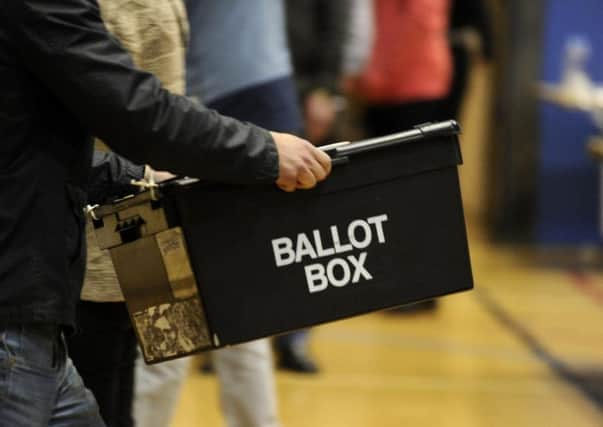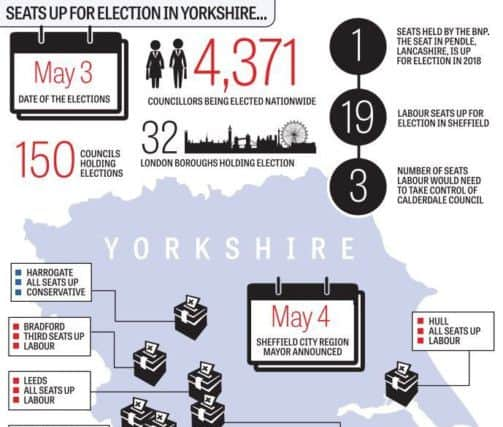Yorkshire local elections 2018: Trees could be key in Sheffield as voters return to ballot box


It was less than a year ago that Theresa May’s ill-fated decision to call a snap General Election, combined with an unexpectedly strong showing by Jeremy Corbyn’s Labour, led to the Conservatives’ majority in Parliament being dramatically eroded.
And after 12 months of fluctuating fortunes for the Prime Minister and Her Majesty’s Opposition, voters will soon have another chance to make their feelings known at the ballot box.
Advertisement
Hide AdAdvertisement
Hide AdElections for city, metropolitan borough and district councillors take place on May 3, with 10 authorities in Yorkshire and the Humber holding votes for some or all of their representatives.
The weeks of campaigning leading up to the elections are likely to see local issues come to the fore. But according to Lord Robert Hayward, a Tory peer and elections analyst, the majority of the electorate will vote based on their views of party politics at a national level.
“Given that a third of the electorate turn out at local elections, the question is who are the third that are turning out,” he told The Yorkshire Post.
“Generally they go heavily against the incumbent government, and particularly after eight years of austerity the Tories can reasonably expect to be mullered. But that is the reason I don’t expect it to impact on Theresa May’s prime ministerial role.”
Advertisement
Hide AdAdvertisement
Hide AdA possible exception to this trend is in Sheffield, where the city council’s controversial tree-felling work has united figures as diverse as Environment Secretary Michael Gove and Pulp singer Jarvis Cocker in opposition.


According to the Local Government Information Unit think-tank, the authority has 19 Labour seats up for election, and the ruling administration would need to be defeated in 12 of these to lose power.
According to Lord Hayward the anger caused by the council’s £2bn Private Finance Initiative contract with Amey makes Sheffield “one of those very few areas of the country where a single issue will have a big impact”.
He said: “It is striking that Sheffield City Council has suddenly stopped cutting down trees; I would regard that as clearly election-motivated.
Advertisement
Hide AdAdvertisement
Hide Ad“Looking from afar, if you want an issue to taper off you don’t stop it in the last week in March when the elections are in May.”


Potentially more significant is the election of South Yorkshire’s first directly-elected mayor, the result of years of work to get a devolution agreement handing over powers from Whitehall.
But with Doncaster and Barnsley councils pulling out last year, it means the successful candidate will have virtually none of the powers initially promised by then-Chancellor George Osborne in 2015.
Barnsley MP Dan Jarvis, representing Labour and the Co-operative Party, is considered the front-runner for the role, though there are six other candidates.
Advertisement
Hide AdAdvertisement
Hide AdElsewhere in Yorkshire, the majority of councils holding elections are expected to stay under the control of Labour.
Two West Yorkshire authorities classed as being in ‘no overall control’, with no single group having a majority of seats, could also go red on May 3. Labour are two seats short of a majority in Kirklees and three in neighbouring Calderdale. In the latter, Labour has 23 seats, the Conservatives 21 and the Liberal Democrats five, with two independents. Labour need to get to 26 to take control.
According to Lord Hayward: “I would be surprised if Labour didn’t take control of Kirklees but I don’t think they will take control of Calderdale.
“If you look at the split seats [in Calderdale], Labour may lose one to the Liberal Democrats, which will put them even further away, they may gain others but not enough. My guess is that they will take Kirklees but not Calderdale.”
Advertisement
Hide AdAdvertisement
Hide AdAcross the country, all the metropolitan boroughs other than Doncaster and Rotherham, which had boundary changes in previous years, have elections.
And a number of local authorities, including Leeds, Hull and Harrogate, will hold all-out elections, with every council seat up for grabs, as a result of recent boundary changes.
Much of the national media attention will be centred on London, with changes to the capital’s population meaning the Conservatives are facing ever-greater challenges to hold on to the councils they control.
These seats were last fought in 2014, and Lord Hayward suspects the party will fare worse this time round after four more years in power at Westminster and with its travails over Brexit.
Advertisement
Hide AdAdvertisement
Hide AdOf the nine councils currently held by the Tories, he predicts Richmond and Kingston will be lost, with others also at risk of falling to Labour.
“Westminster and Wandsworth are two totemic Tory boroughs; they have the fight of their lives to hold on to both,” he said. “Westminster has never been anything other than Conservative. They are both toss-ups, and losing them would be a big blow to the Tories.”
One factor that makes the race in London harder to predict is the issue of whether the recent complaints of anti-Semitism against Labour will harm its prospects in Jewish areas.
According to Lord Hayward: “Barnet is the Jewish borough in London. Labour are very clearly wanting to take control of it, and I would have expected them to, but if there is a borough in London where the recent controversies will have had an impact it would be Barnet.
Advertisement
Hide AdAdvertisement
Hide Ad“There are reports that it is beginning to hit the Labour support in that part of London.
“Clearly there is a parallel in north Leeds but most of the seats in north Leeds, and Leeds generally, are pretty safe in one direction or another, so it won’t have quite the same effect.”
Such is the demographic shift in London, Conservatives are already suggesting privately that, for Labour, anything other than sweeping the board across the capital would be a disappointment. But Lord Hayward says: “The [national] opinion polls in 2014 had the Tories and Labour neck and neck, and they have them neck and neck at the moment. As the Tories are doing badly in London, they may be doing better somewhere else. The question is where and will it have an impact.”
Troubled Ukip in fightback bid
Over the weekend, Ukip announced that it would be fielding more than 530 candidates in the local elections.
Advertisement
Hide AdAdvertisement
Hide AdA spokesman for the embattled party described this as a “remarkable achievement given that just six weeks ago Ukip was thought to be on the edge of collapse”.
Its interim leader Gerard Batten said: “Our branches, activists and members have found fresh heart and motivation and are back in the fight.” Despite this, Lord Hayward says the number of seats contested by the party has fallen by three quarters since 2014.
Elsewhere, the number of Liberal Democrat and Green Party candidates has risen. Both parties could take advantage of the tree-felling controversy in Sheffield, while the Liberal Democrats will hope to increase the size of their group of 10 councillors in Harrogate.